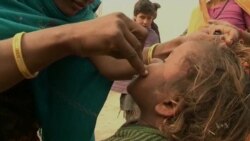The World Health Organization is urging adults to get their children immunized against deadly and debilitating diseases, and to make sure their own immunizations are up to date. The WHO observes World Immunization Week between now and April 30.
The international push to eliminate polio has put this disease on the verge of eradication worldwide. When that happens, no one will ever suffer paralysis or death from polio again. India is the latest country to become polio free.
The GAVI Alliance www.gavialliance.org/ is one of the organizations that gets vaccines to children in developing countries. Dr. Seth Berkley, GAVI's chief executive officer, said, "Since we’ve started, we’ve immunized more than 440 million children and have prevented more than 6 million deaths. The challenges that are still in front of us is that there are still about 22 million children that are not fully immunized."
The World Health Organization reports that immunization prevents two to three million deaths per year from childhood diseases and two types of cancer. This year, the WHO is encouraging people to make sure their family's immunizations are up to date.
And while most parents in developing countries want their children immunized, a growing number of parents in Western countries are choosing not to. Steve and Victoria Carrico are among them. Like most parents who choose not to vaccinate their children, the Carricos say they are concerned about possible side effects.
At the U.S. National Institutes of Health, Dr. Anthony Fauci said that in developed countries, the success of vaccines has been their downfall.
"Years and years ago, when there were many children throughout the world -- developed countries and developing nations -- getting ill and dying or getting maimed from diseases like polio, measles, mumps, rubella, haemophilus. Vaccinations were so successful in decreasing the burden of disease that people now, when they think about vaccinations, they think about the very rare event of a possible adverse event from a vaccine, and shy away from vaccines, thinking that vaccines are the problem when in fact, vaccines are preventing us from getting very serious illness," said Fauci.
Berkley said money spent on vaccines means less money is needed to treat disease and disability. "Vaccines are among the most effective and cost effective interventions that exist," he said.
Berkley says some parents worry that a vaccine might be damaged if it is not properly refrigerated. He said such a situation might make the vaccine ineffective, but it is not likely to be harmful.
The international push to eliminate polio has put this disease on the verge of eradication worldwide. When that happens, no one will ever suffer paralysis or death from polio again. India is the latest country to become polio free.
The GAVI Alliance www.gavialliance.org/ is one of the organizations that gets vaccines to children in developing countries. Dr. Seth Berkley, GAVI's chief executive officer, said, "Since we’ve started, we’ve immunized more than 440 million children and have prevented more than 6 million deaths. The challenges that are still in front of us is that there are still about 22 million children that are not fully immunized."
The World Health Organization reports that immunization prevents two to three million deaths per year from childhood diseases and two types of cancer. This year, the WHO is encouraging people to make sure their family's immunizations are up to date.
And while most parents in developing countries want their children immunized, a growing number of parents in Western countries are choosing not to. Steve and Victoria Carrico are among them. Like most parents who choose not to vaccinate their children, the Carricos say they are concerned about possible side effects.
At the U.S. National Institutes of Health, Dr. Anthony Fauci said that in developed countries, the success of vaccines has been their downfall.
"Years and years ago, when there were many children throughout the world -- developed countries and developing nations -- getting ill and dying or getting maimed from diseases like polio, measles, mumps, rubella, haemophilus. Vaccinations were so successful in decreasing the burden of disease that people now, when they think about vaccinations, they think about the very rare event of a possible adverse event from a vaccine, and shy away from vaccines, thinking that vaccines are the problem when in fact, vaccines are preventing us from getting very serious illness," said Fauci.
Berkley said money spent on vaccines means less money is needed to treat disease and disability. "Vaccines are among the most effective and cost effective interventions that exist," he said.
Berkley says some parents worry that a vaccine might be damaged if it is not properly refrigerated. He said such a situation might make the vaccine ineffective, but it is not likely to be harmful.





